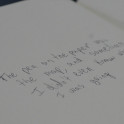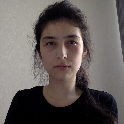I've always attached part of my existence to the capacity of writing. Even before I understood that putting different letters together would create words, I would already express myself with colored pencils and white paper. Apart from my sisters, I was not drawing, I was scrapping letters that I saw in my mother's big teacher's books. Growing up, I took a long time to master the spoken language, but I learned how to read and write precociously: at 4 years old. Before I completed my first decade of life, the habit of writing was so mine that the warmth of the words written with my tilted calligraphy on straight lines was strong enough to warm me. And this feeling was so strong and reciprocal that I would write every night before sleeping and consistently, with no exception, I would let a notebook under my pillow. On the attendance list of my bed, there were only three students: me, the notebook, and the pencil. In the future, I am no longer writing my last words before I sleep. At this moment, I'm waiting for the words of a doctor, who reviews, for the last time, what he is going to tell me: the lump in my dominant forearm is a tumor. The words are not necessarily awkward, the doctor probably had told them about a thousand times; they are, however, different for my ears. I start to laugh because I don't know how to react when he tells me that it is rare. Well, winning the lottery is also rare, but that is not the rarity I got. When I leave the clinic, everything in my life goes so fast that it felt like every day was a movie, but I would only watch the trailers, numbed enough not to live any experience. So many things went through my mind non-stop. Sometimes, when I get bad news, everything stops for a second until it gets back to normal speed. I always wish that this moment would last longer, not seconds, but days; which is impossible. Life goes on. Some yet-to-be-introduced character in your life is working at the moment. Some left-too-early character in your life is taking a pet for a walk. Some never-will-be-known character is also receiving bad news and is also wishing time would stop. For this character, time also did not stop. I was not wronged for cutting my frustration short - if anything, this was the reinforcement of my humanity. One day before my surgery, I write my last words in the notebook. It is a farewell letter. I don't know if I am coming back. I don't know if I am coming back horribly limited. I also write my last letter addressed to my grandmother. She died from cancer before I was born, so I never got to meet her. She could not read or write. I always believed I was writing for both me and her. I apologize. I probably am going to lose the last link I have between us. And I am sorry for my father, that will lose in me the last living thing that could remind her mother. Every word she could pronounce I wrote in notebooks spread by the house. At least, that's what he told me. I get into surgery. I thought - and this is something that did not quite change from the past to the present - so ironic that the hand that allowed me to write all my dreams in the format of a poem and all my fears like long proses was, also, the hand that could lose its movements due to a cluster of inconvenient cells that were pressing my tendon. After arriving home, the post-operation pain already was making me feel like the surgery was being performed with me wide awake. I was advised to take sleeping pills. But I did not sleep as fast as it was promised. On the attendance list, the notebook and the pencil did not confirm their presence on my bed. The impossibility of writing about the storm of feelings, fears, and insecurities made me feel everything even more intensely. The lack of the noise of the pencil touching the paper was as if every television, every radio, and every sound machine in the world was turned off at the same time. And I think about Paulo Freire, patron of Brazilian education, and I know his work on “Pedagogy of the Oppressed” does not refer exactly to it, but I feel in a pedagogical oppression scenario. The problem is that the oppressor is my body, and so is the oppressed. No one from my family walks into my room, they don't knock and don't even make any noise. Nobody including a part of mine, who is watchful on the other side of the door, waiting to get in when everything is alright. Which takes some time. Between frustrated attempts of writing with my left hand and tears over the fear of never writing again, this is the very first night I sleep without the notebook under my pillow.
The fact that having surgery felt normal wasn't fair. I shouldn't have been used to it, but after twelve other surgeries, I was. I was used to everything that happened a couple hours before the surgery. I would meet the nurses, then get dressed into a hospital gown, then have an IV put in, then talk to the anesthesiologist, then see Dr. Galagher. It was a routine that I was comfortable in. “We're hoping to get this over with as soon as possible because I have someplace to be afterward.” I think the doctor meant to say that with the hopes that it would comfort me, and it would be over really soon. It didn't. It made me feel more uneasy that she would then just be rushing to get it over with and could easily make a mistake. After all, it's my face they're messing with. Unfortunately, I'm stuck with it for life. When the anesthesiologist came over, he seemed very carefree and charismatic. My mom spoke with him for a few minutes: “I normally come with her into the surgical room until she falls asleep.” He laughed a little at that and I cringed. It was carefree and made me feel childish for wanting to have my mom in the room. Maybe it was a little childish. After he finished laughing, he spoke again, winking at me. “Now that she's 18, you are technically not allowed to come in with her. Besides, sometimes having parents in the room makes the patients more uneasy. So, it's probably better off if you're not there.” My stomach dropped. There was never a time when my mom was not by my side when I fell asleep for a surgery. That was when other thoughts started roaming through my head too. I'm 18, I'm going to college in a few months, I'm not gonna have my mom at all. . . I shouldn't have had that surgery in the first place. They promised that the last one I had would be the last one. But there I was. And now, they weren't letting my mom hold my hand in the surgical room. Tears started to streak down my face. I was 18, I'd been through all of this before, I should not have been crying. But I was. The nurses wiped my eyes and my mom explained to them that she normally comes with me. “Would you like us to talk to the anesthesiologist about it?” they asked. I didn't want to cause trouble and I knew that I needed to get over this, so I told them it was fine. My mom probably wasn't fine with it but being separated from her is a part of growing up. I wasn't sure if I wanted to grow up anymore. She kissed me on the cheek before they started rolling me away on the stretcher to the surgical room. Whenever I was in a surgical room, my senses seemed to be heightened and I shivered and clattered my teeth together. Everyone acted normal, talking to me about my life and I tried my best to respond without a shaky voice. They always seemed to end their sentences with my name, as if they thought it would bring me reassurance in some way. It didn't—it was just weird. You're not scared. You're not scared. Get a grip. “Your arm might sting for a few seconds, okay, Abigail?” I knew what that meant. The anesthetic was going in. They felt for a vein and put the thick needle in. A burning sensation shot up my hand. It traveled to my arm as they continued talking to me about pointless things. After a few minutes of their chatter, they asked a question which made me tense. “We're gonna put an oxygen mask on you now, okay, Abigail?” Alarm and panic shot through me like a gun. I hated oxygen masks. Maybe it was because of the times when I was too young for them to put anesthetic through an IV, so they had to use a mask. I could never forget the putrid scent of beach balls and hand sanitizer as I struggled with the nurses to get the mask off. As they put the mask on my face this time, I reminded myself that it wasn't the same. It was oxygen, not anesthetic. I forced myself to be calm but all I wanted was my mom to be holding my hand like she always did. She would wipe my tears from my face and say, “It's just oxygen. It's not gonna hurt. I'm right here, and I'll be right by your side when you wake up.” She wasn't there anymore. “Can you count down from ten for us, Abigail?” I knew what this part meant too. By the time I counted down from ten I would be unconscious, no matter how hard I wanted to fight it. “Ten.” The anesthetic burned up my arm. “Nine.” The doctors continued to chat around me. “Eight. Seven.” I shivered until something warm was placed around my body. A heated blanket—they called it the Bear Hugger. “Six. Five.” The warmth didn't stop me from shivering. Despite the amount of times I had done this, I was scared. “Four.” Everything started spinning. Don't be scared. “Three.” I could barely hear their voices anymore. “Two.” I wished my mom was there. “One.”









